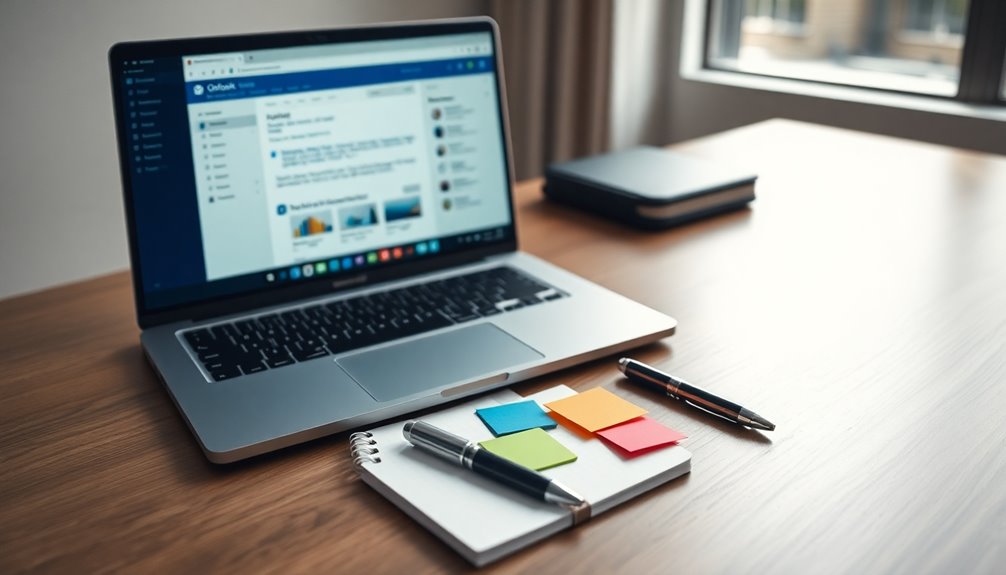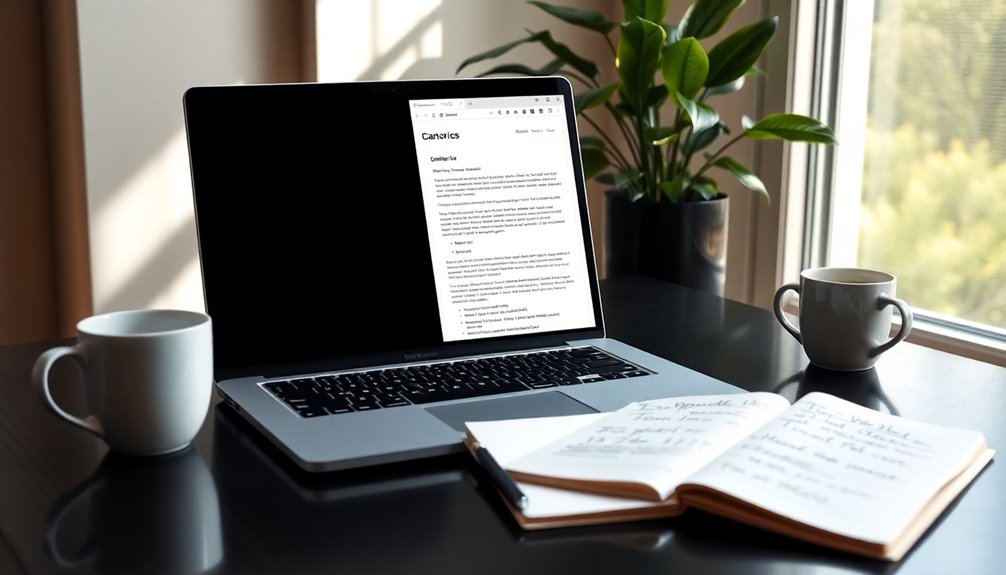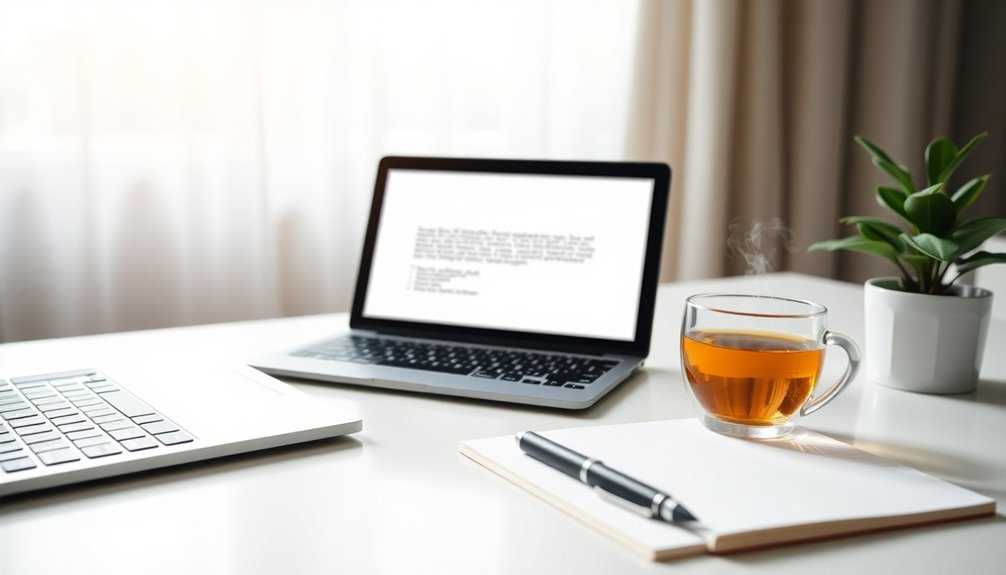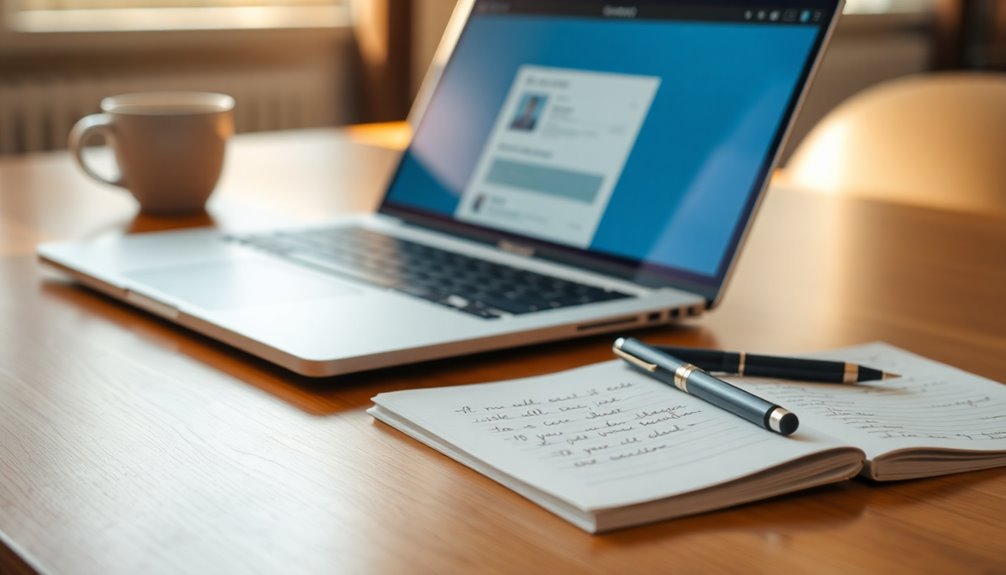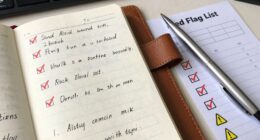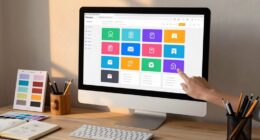To impress with your thank-you email after an interview, send it within 24 hours. Start with a clear subject line like "Thank You for the Interview." Personalize your message by addressing the interviewer by name and mentioning specific topics discussed. Express your gratitude and restate your enthusiasm for the role, tying in key qualifications. Keep it brief—between 80 to 150 words works best. Avoid discussing salary and proofread for errors. A thoughtful note can differentiate you from other candidates and strengthen your professional relationship. Stay tuned to discover more tips for crafting the perfect thank-you email!
Key Takeaways
- Send your thank-you email within 24 hours to show enthusiasm and respect for the interviewer's time.
- Personalize your message by addressing the interviewer by name and referencing specific topics discussed during the interview.
- Restate your enthusiasm for the role and highlight key qualifications that align with the company's values and culture.
- Keep the email concise, aiming for 80-150 words, using clear language to enhance readability.
- Proofread your email for typos and grammatical errors to maintain a professional image and ensure clarity.
Introduction
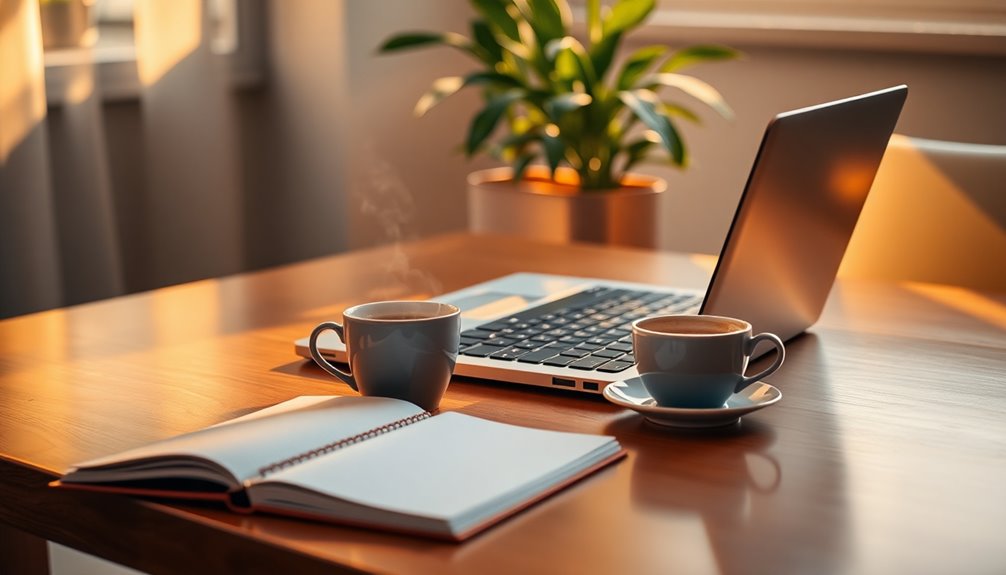
In today's competitive job market, sending a thank-you email after your interview isn't just a nice gesture—it's a strategic move that can set you apart. This professional courtesy can significantly strengthen your impression on the hiring manager and influence their decision-making process.
In fact, 75% of HR managers consider these notes impactful, so taking the time to craft a thoughtful thank-you email can really benefit you as a candidate for the job.
Timeliness matters; sending your thank-you email within 24 hours demonstrates your enthusiasm for the opportunity and respect for the interviewer's time. Unfortunately, 69% of candidates fail to do this, creating a chance for you to stand out.
Personal touches are essential, too—86% of employers see a lack of follow-up emails as a deficiency in commitment.
Keep your message concise, ideally between 80-150 words, to ensure clarity and professionalism. A well-crafted thank-you email not only expresses your gratitude but also reinforces your qualifications for the role.
Builds Lasting Professional Relationships
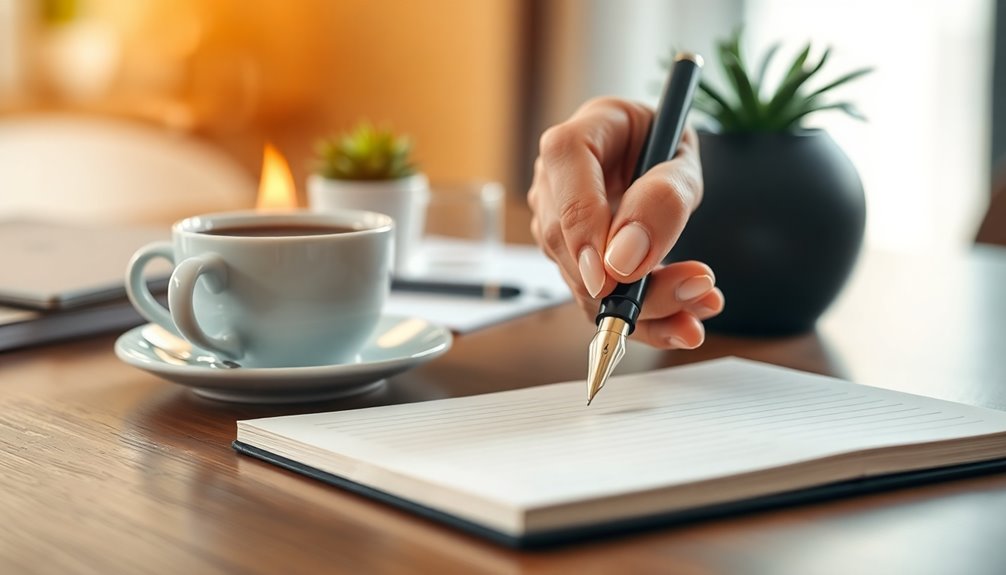
A thank-you email not only expresses gratitude but also lays the groundwork for lasting professional relationships. By sending a thank-you note within 24 hours after your interview, you show respect for the interviewer's time and reinforce your professionalism. Additionally, following up promptly demonstrates your commitment to effective communication, which is critical in professional settings. This commitment can also be likened to the importance of open communication in personal situations, such as supporting children through divorce. Recognizing the value of professional help can further enhance your ability to navigate workplace relationships effectively.
Moreover, maintaining mental clarity during follow-up communications can help articulate your thoughts more effectively and leave a stronger impression.
Personalizing your message with specific references to the conversation can create a memorable connection, making it easier for interviewers to recall your positive impression. When you address the interviewer's name and include details from your discussion, it demonstrates your genuine interest in the position and the company.
This approach not only conveys your appreciation for the time they spent with you but also highlights your attention to detail. Following up with a thoughtful thank-you email can lead to valuable networking opportunities, as interviewers might remember you for future roles or referrals within their professional circles. Additionally, a well-crafted thank you email after interview discussions reinforces your enthusiasm for the role and reminds the interviewer of your key qualifications. It provides an opportunity to reiterate your interest in the position and address any points that may not have been fully covered during the conversation. By taking this extra step, you demonstrate not only professionalism but also a genuine commitment to building a meaningful connection.
Research shows that 75% of HR managers view thank-you notes as influential in hiring decisions. By crafting a well-structured thank-you email, you leave a lasting impression and build a foundation for future interactions. Additionally, your ability to reflect on the interview experience can aid in overcoming imposter syndrome, allowing you to approach future opportunities with confidence.
Don't underestimate the power of a professional closing; it can further solidify your image as a candidate who values relationships.
Highlight Shared Interview Insights
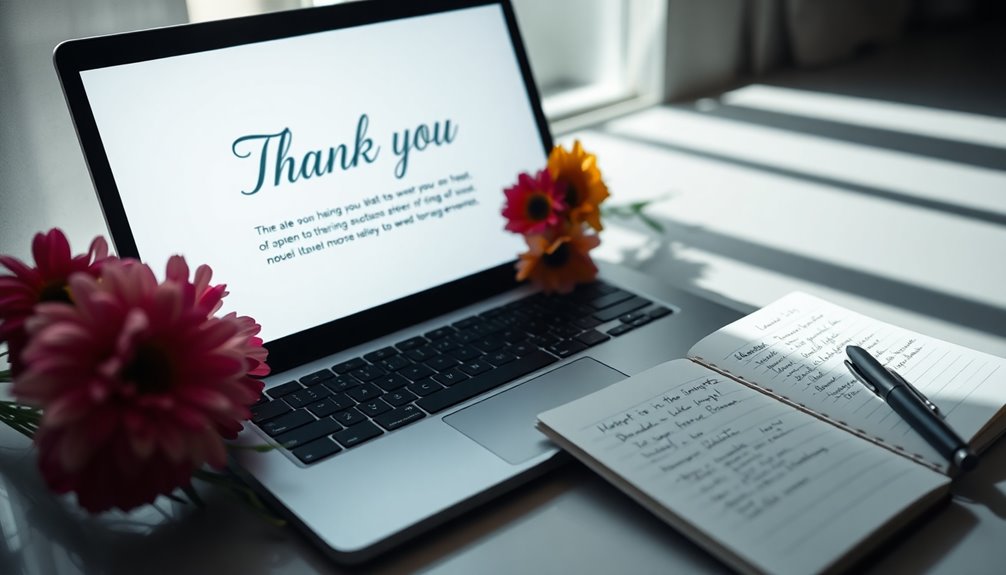
Highlighting shared insights from your interview can significantly enhance your thank-you email. By personalizing your message to reference specific topics you discussed, you create a stronger connection with the interviewer. For instance, mentioning shared interests or experiences can make your email more memorable and engaging. This not only shows you were attentive but also emphasizes the possibility of working together.
When you cite particular projects or challenges discussed during the interview, it demonstrates your genuine interest in contributing to the company's goals. Including any unique perspectives or solutions you offered can further reinforce your qualifications and fit for the role. This way, your thank-you email becomes more than just a formality; it showcases your enthusiasm and readiness to be part of the team.
Additionally, tailoring your email to reflect the company culture and values discussed during the interview can highlight your alignment with the organization. Expressing gratitude with phrases like "I appreciate your consideration" adds a personal touch that can leave a lasting impression.
Step-by-Step Guide to Thank You Emails

After you've personalized your thank-you email by referencing shared insights from the interview, it's time to focus on the structure of your message.
Start with a clear subject line like "Thank You for the Interview" to capture the recipient's attention promptly.
Next, personalize the greeting by addressing the interviewer by name. Express your sincere gratitude for the interview opportunity, reinforcing a positive tone.
In the body of your email, reference specific topics discussed during the job interview to demonstrate your attentiveness and engagement. This strengthens your connection with the interviewer.
Restate your enthusiasm for the role and the company, while briefly highlighting key qualifications that align well with the position. This reminder can leave a lasting impression.
Aim to send the thank-you email within 24 hours post-interview; timely follow-up reflects professionalism and sets you apart from other candidates.
Don't forget to include your contact information at the end, making it easy for the interviewer to reach out if needed.
Following this step-by-step guide ensures your thank-you email isn't only polished but also impactful.
Dos and Don'ts for Thank You Emails
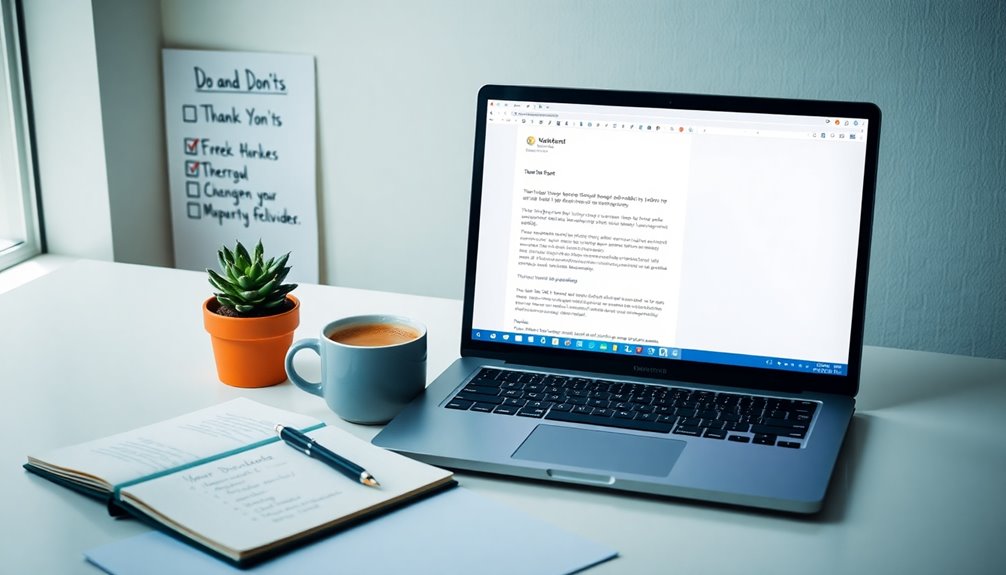
Crafting an effective thank-you email involves knowing what to include and what to avoid. First, be sure to personalize your thank you email by referencing specific topics discussed during the interview. This shows attentiveness and creates a memorable impression.
Avoid sending a generic note, as a lack of personalization can come off as insincere.
It's crucial to send your thank you email within 24 hours of the interview. This demonstrates your enthusiasm and respect for the interviewer's time.
However, steer clear of discussing salary or benefits; this can seem unprofessional and distract from your appreciation.
Finally, always proofread your email for typos and grammatical errors. Attention to detail reflects professionalism and care in communication.
A well-crafted thank you email can solidify your positive impression, so take the time to ensure it's polished and impactful.
Examples of Impactful Thank-Yous
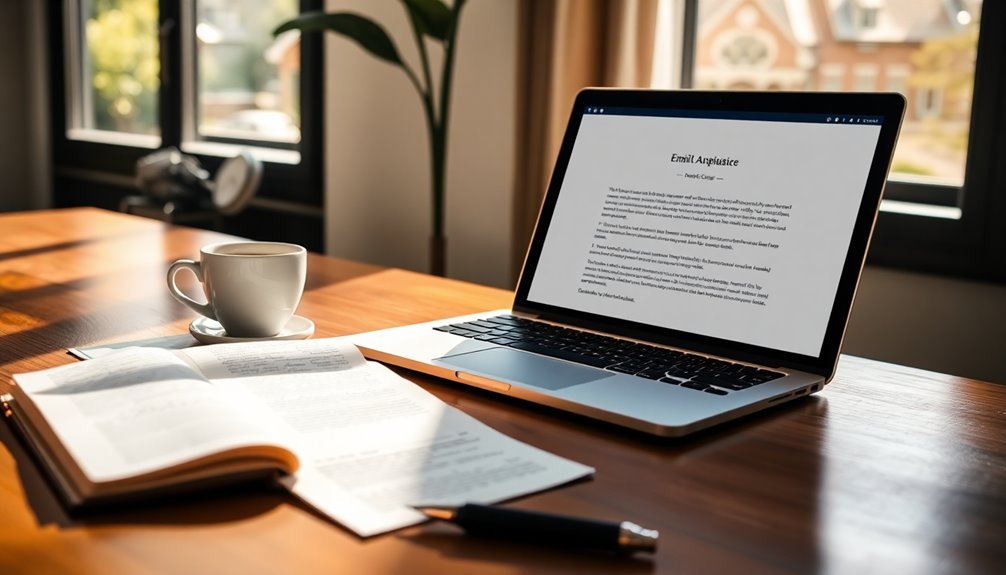
What makes a thank-you email truly impactful? It's all about personalization and clarity. Start by referencing specific topics discussed during your interview. For instance, if you talked about a project the team's working on, mention how your skills align with that project. This shows attentiveness and reinforces your fit for the role.
Express your gratitude clearly and concisely. A simple line like, "Thank you for the opportunity to discuss the role; I truly appreciate your time," works wonders.
Don't forget to convey your enthusiasm for the position. Let them know you're excited about the possibility of contributing to their team.
Including a call to action is also essential. You might say, "I look forward to hearing about the next steps in the hiring process." This not only shows initiative but also reiterates your interest in the position.
Lastly, remember to send your thank-you email within 24 hours of the interview. A timely follow-up can leave a lasting impression, making your note stand out among others.
Pro Tips for Writing Effective Emails
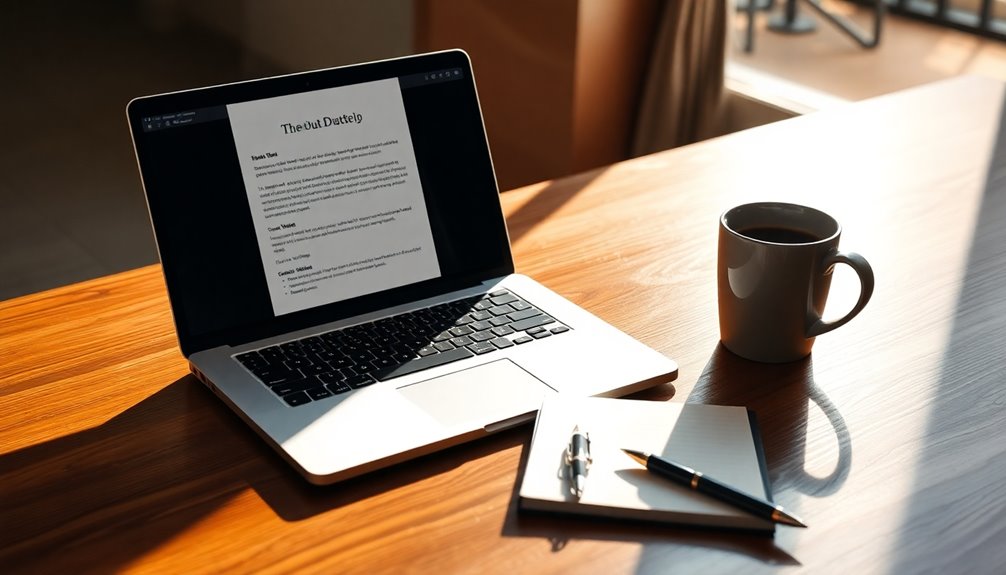
Effective emails can make a lasting impression, especially after an interview. Start by crafting a clear subject line, like "Thank You for the Opportunity," to ensure your email stands out in the recipient's inbox.
Personalizing your greeting by addressing the interviewer by name helps create a connection and shows attention to detail.
When writing your follow-up email, express genuine gratitude for the interviewer's time and insights. Remember, 86% of employers view a lack of appreciation negatively.
Highlight specific topics discussed during the interview to reinforce your attentiveness and demonstrate your fit for the role.
Aim for a concise email, ideally between 80-150 words, to maintain clarity and respect for the interviewer's time. You want to make it easy for hiring managers to read your message without feeling overwhelmed.
Utilizing email templates can streamline your process, but ensure each message feels personal and tailored. Additionally, consider incorporating budgeting strategies to reflect your understanding of financial planning, which can be an attractive quality for many employers.
Final Thoughts

As you reflect on your interview experience, remember that a well-timed thank-you email can set you apart from other candidates. Sending your thank-you email within 24 hours post-interview is crucial; 86% of employers view a lack of follow-up as a deficiency in follow-through.
Personalizing your message by referencing specific topics from your interview reinforces your attentiveness and helps the interviewer remember you positively.
Maintaining a professional tone while adding warmth is essential. Studies show that 75% of HR managers find thank-you notes influential in their decision-making process.
Keep your email concise, ideally between 80-150 words. This demonstrates respect for the interviewer's time and showcases your communication skills. Focus on your qualifications while reinforcing your interest in the position and the company. Highlight specific points from your interview to create a lasting impression that may sway hiring decisions in your favor.
Ultimately, a thoughtful thank-you email not only shows your appreciation but also reinforces your enthusiasm for the role. By taking this small but impactful step, you enhance your chances of standing out in a competitive job market.
Don't underestimate the power of a well-crafted follow-up.
Frequently Asked Questions
How Do You Write an Amazing Thank You Email After an Interview?
Writing an amazing thank you email after an interview involves a few key steps.
Start with a clear subject line to grab attention. In your opening, express genuine gratitude for the opportunity.
Mention specific topics you discussed to show you were engaged. Keep the email concise, ideally between 80-150 words, and maintain a professional yet warm tone.
Make sure you send it within 24 hours to showcase your enthusiasm.
How Soon Should I Send a Thank You Email After an Interview?
You should send your thank you email within 24 hours of your interview.
This quick follow-up shows your eagerness for the position and distinguishes you from other candidates.
If your interview was late in the day, it's best to wait until the next morning to send your note, respecting the interviewer's schedule.
How Do You Say Thank You for an Interview Professionally?
To say thank you for an interview professionally, start with a personalized greeting using the interviewer's name.
Express genuine gratitude for their time and insights.
Reference specific topics from your conversation to show you were engaged.
Reaffirm your enthusiasm for the position and how your skills align with their needs.
What Not to Say in a Thank You Email After an Interview?
When crafting a thank-you email after your interview, avoid generic phrases like "thank you for the opportunity," as they can sound insincere.
Don't mention salary or benefits; focus on your enthusiasm for the role instead.
Steer clear of any negative comments about the interview process or other candidates, as this reflects poorly on you.
Lastly, keep your language professional; humor or overly casual tones might undermine your message.

